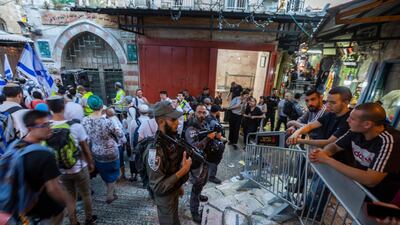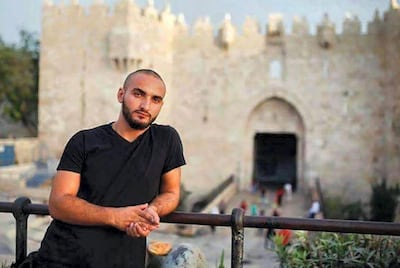For the entirety of Palestinian photojournalist Mustafa Al Kharouf's 32-year life, he has been stateless. Now he is facing deportation from Jerusalem, the city his father was born in, to Jordan where he has no historical connection. Israel's Supreme Court will make the final decision but the case has highlighted the issue of press freedom and residency status for Palestinians in Jerusalem.
Mr Al Kharouf was born in Algiers to a Palestinian father from Jerusalem and an Algerian mother. Under Algerian law, however, his mother could not pass on citizenship to him and his five siblings. When Mr Al Kharouf was 12, the family moved back to Jerusalem and his father tried to apply for residency for the family. However, Israeli authorities told him he needed to prove that their centre of life was in Jerusalem for seven years before doing so, according to Adi Lustigman, a lawyer representing the Al Kharouf family with the Israeli NGO Hamoked.
When Mr Al Kharouf's father could finally apply, Israeli authorities denied the residency application, saying that he was by that point 18-years old and therefore too old to be included in the family's case.
Israel instead granted him a work visa, given his role as a photographer for the Turkish Andalou News Agency. A year later when he went to renew his visa, Mr Al Kharouf was denied on security grounds, said Ms Lustigman.
Israeli authorities cited photos that he had posted online of protests and accused him of being connected to Hamas, which he denied. Mr Al Kharouf had previously been arrested by Israeli authorities twice, though never charged for photographs from demonstrations that he had posted on Facebook.
Mr Al Kharouf's lawyers appealed but on the same day, the Israeli authorities arrested him claiming he was living and working in the holy city illegally. The case has since gone through several stages, with authorities refusing to release Mr Al Kharouf during the proceedings because of his alleged political ties.
He has denied any politics contacts with Hamas throughout the case. “I do not belong to any side,” he said in court, according to Israeli media. “I am a journalist. I do not write, I photograph... Let them give me a list of people with whom I cannot speak and publish it in all the newspapers.”
Now Mr Al Kharouf is waiting for a Supreme Court ruling, expected any day now, to make the final decision on whether he can stay or has to go. If he is deported to Jordan, authorities there will likely send him back – given that he is not a Jordanian national – and this will lead to another round of hearings, said Ms Lustigman.
Meanwhile, Mr Al Kharouf has a wife and young child in Jerusalem whose fates are also tied to his uncertain future.
"Expelling someone to a country with which they have no ties is a cruel punishment," said Sophie Anmuth, the head of Middle East desk at Reporters Without Borders, a media freedom organisation. "It seems likely that the real reason for wanting to deport Mustafa al Kharouf is linked to his work as a photographer and to his sharing photos on social networks. We call on the authorities to free him at once and to quickly give him residency papers."
Palestinian residents of Jerusalem make up about a third of the city's residents, but they are not citizens. They are allowed permanent residency that grants them many of the same rights as Israeli citizens, but also mandates that they remain living in Jerusalem to maintain it.


